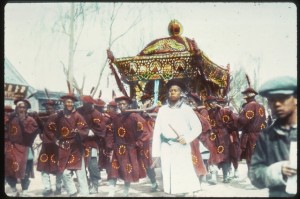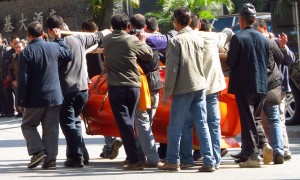Hiring professional mourners is a common practice in many parts of the world, especially in rural China. Yet one mourning practice has inspired a country-wide crackdown.
In recent years, some families in China have hired exotic dancers to perform at their loved one’s funerals.
If you have trouble picturing a striptease at a funeral, you’re not alone. This is a trend specific to rural communities in China. Chinese authorities are already trying to ban the practice in accordance with the country’s strict pornography laws.
The brief history of this tradition is closely tied to globalism and economics. While hiring exotic dancers is a fairly new tradition, its roots can be traced centuries ago in the form of “kusangren.”
The more mourners a person has at his funeral, the better social standing he has in the community.
Kusangren is the hiring of professional mourners to honor the dead, and to attract more people to the funeral. Traditionally, Chinese funerals are elaborate affairs. The more mourners a person has at his funeral, the better social standing he has in the community.
Years ago, close relatives would have to actively mourn their loved ones for days, weeks and even months. It was an exhausting practice. Hiring professionals to do this tiring work for them became commonplace.
So, how did this centuries-old practice extend into a burlesque show? Well, it partly has to do with economics.
Many rural Chinese families spare no expense at funerals in an effort to get as many people to attend as possible. They discovered that hiring exotic dancers attracted people from miles away, even if they never knew the person who had died.
Adults and children watch the performances together, since there is no age restriction at these private memorials. In fact, children are encouraged to attend just as much as adults. People who practice this don’t view the performances as age-inappropriate for minors, since they are a normalized part of a funeral rite.
Parts of rural China are extremely poor, with many families struggling to make ends meet. Despite this dire economic situation, families still spend a great deal of money on these performances in an effort to give their loved ones the biggest gathering they can.
Dance performances have been part of Chinese funeral traditions for centuries, but the eroticized version of this tradition only appeared after globalism began affecting China in the past 100 years.
This tradition also has links to Western globalism. Dance performances have been part of Chinese funeral traditions for centuries, but the eroticized version of this tradition only appeared after globalism began affecting China in the past 100 years.
The allure of exotic dancing increased as the performance became a rarity in the country. It is illegal to be an exotic dancer in China, so many funeral attendees come for the novelty of it.
In some areas of rural China, hiring dancers for funerals is so common that villagers don’t bat an eye. Even the most erotic and seemingly out-of-place performances have become routine in these villages.
This trend is an example of how traditions change based on environment. The core belief is the same: a loved one should have a big send-off. It’s the way families reach the goal that has changed.
In the past, loved ones would throw themselves into deep public mourning for days. This turned into hiring professionals to look mournful for them, and then eventually hiring dancers to lure in more mourners. The common cultural thread is a desire to show their deceased loved one how much they care, even if the method seems inappropriate to some.

 Rural China’s Erotic Funeral Dancers
Rural China’s Erotic Funeral Dancers





 “In Case You Don’t Live Forever” by Ben Platt
“In Case You Don’t Live Forever” by Ben Platt
 Our Monthly Tip: Make an “In Case of Death” File to Ease Loved One’s Grief
Our Monthly Tip: Make an “In Case of Death” File to Ease Loved One’s Grief
 Passing of Beloved Comedian Births a New Comedy Festival
Passing of Beloved Comedian Births a New Comedy Festival














